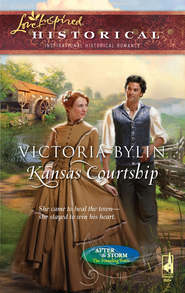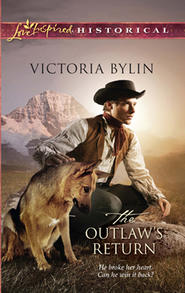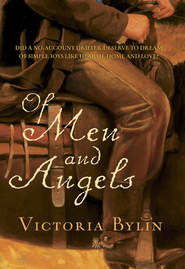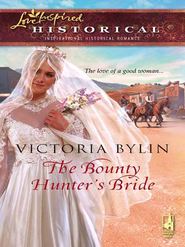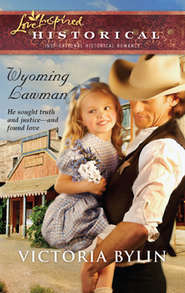По всем вопросам обращайтесь на: info@litportal.ru
(©) 2003-2024.
✖
Marrying the Major
Настройки чтения
Размер шрифта
Высота строк
Поля
As he turned Cairo down the street, the sun hit him in the face. He swiped at beads of perspiration with his sleeve, then nudged Cairo into an easy canter. With the fever lurking in his body and the Bradley sisters in places unknown, there was no time to waste. Jon rode next to him, letting Tristan set the pace.
Three hours passed with no sign of the stage. The sun peaked and was halfway to the horizon when they arrived at the downed bridge. Tristan slid wearily off Cairo, shielded his eyes from the sun and scanned the gorge for the downed stagecoach. He saw only boards from the bridge wedged between rocks and the sparkling water racing past them.
Relief washed over him. “They didn’t get this far.”
“So it seems.”
“We need to push on.” Tristan inspected the sides of the gorge. A trail led to the river and stopped at a sandy bank. The men climbed back on their horses and headed for the crossing with Tristan in the lead. The storm had turned the path into slick mud, but they arrived at the river’s edge without mishap. Cairo didn’t hesitate to wade into the current, but Grandma needed coaxing. When Tristan reached the far bank, he turned and saw his friend urging the skittish horse to take one step at a time. He hoped the river would recede before they had to cross it again, hopefully with the stage driver and the two women. When Grandma found firm footing, she bolted out of the water.
Jon grinned at Tristan. “The old girl did it.”
“Barely,” Tristan acknowledged. “For a minute, I thought you’d have to carry her.”
Jon smiled at the joke, then looked down the road. Tristan followed his gaze with the same questions in mind. Had the stage come this far and turned back? Had it gone off the road before reaching the bridge? He also had to consider the Carver gang. Fighting fever, Tristan acknowledged the cold facts. Anything could have happened. The quinine could already be lost, and the women could be hurt or trapped or worse.
With no time to waste, he barked an order at Jon. “We still have daylight. Let’s go.”
He nudged Cairo into a comfortable trot. Jon stayed with him, but at dusk Tristan admitted defeat. They hadn’t seen a single sign of the coach. With the fever nipping at him, he gave in to Jon’s suggestion that they strike camp for the night. They’d start looking again in the morning.
Caroline Bradley awoke on the hard ground with a jolt. Dawn had broken with startling splendor, but it wasn’t the golden light that roused her from a troubled sleep. It was the snap of a twig, then the frustrated muttering of a male voice. She clutched the shotgun she’d found in the boot of the stagecoach. She’d slept with it for two nights, and she knew how to pull the trigger. If the Carver gang had come back, she’d use it.
Three days ago she and Bessie had left Cheyenne for Wheeler Springs. They’d had the coach to themselves, so they’d passed the hours speculating about Tristan Willoughby Smith, his children and what life would be like on a cattle ranch. Not once had they imagined the stagecoach being robbed by the Carver gang. Thanks to the sacrifice of the driver, they’d escaped while he’d challenged the outlaws with his pistol. She and Bessie had run for their lives and hidden in a ravine, listening as the Carvers killed the driver and ransacked their trunks and other shipments. When the outlaws finished, they’d stolen the horses and pushed the yellow coach into the ravine.
Cracked and lying on its side, the old Concord had offered adequate shelter from the sun, very little from the rain and none from the frightful howling of wolves.
In the scramble down the hill, Bessie had sprained her ankle. By herself, Caroline had piled rocks on the dead driver, then she’d salvaged what she could of their possessions. In the course of her efforts, she’d found a crate addressed to Major Smith from the Farr, Powers and Weightman Chemical Laboratory in Philadelphia. It had been opened and the contents had been dumped without care. In the pile of broken bottles, she’d seen a label marked “Sulphate of Quinine.” Knowing the value of the medicine, she’d salvaged seven of the twelve bottles. They were wrapped in an old nightgown and hidden in the stagecoach for safekeeping.
She knew the major was ill, and she’d assumed he had a chronic illness or a war injury. Now she wondered if he was suffering from malaria. It had been a scourge during the war that had destroyed the South. Bessie had served as a nurse during the conflict, and she’d complained often that illness killed more men than mini balls. Major Smith, it seemed, was a very ill man. Seeing the medicine, Caroline had thought of his motherless children. Who would love them if they lost their father? Malaria was a fickle disease. It could take a man’s life in a day or linger in his blood for years.
Outlaws had the same penchant for randomness. Aware of the slow, measured steps coming toward her, Caroline weighed her options. Bessie’s ankle meant they couldn’t run. Neither could they hide. Huddling against the undercarriage of the coach, she whispered into her sister’s ear. “Bessie, wake up but don’t move.”
Her sister’s eyelids fluttered open.
The footsteps were closer now. A bird took flight from a cottonwood. Caroline wanted to fly away, too. Instead she clutched the shotgun. The steps came closer. She heard the slide of dirt and rock as he reached the bottom of the hill, then the thump of leather on dirt as he paced toward the coach. A squirrel leapt from one branch to another, springing high and then landing with a bounce. Leaves fell like dry rain. With each step the stranger came closer to the coach until all noise stopped. Caroline took a breath and held it. Nothing stirred. Not a bird. Not a breeze. Bessie lay still, watching with wide eyes and signaling her with a nod to be brave.
Leaping to her feet, Caroline aimed the shotgun at the man’s chest. “Who are you?”
He looked at her as if she were no more dangerous than a gnat. Refusing to blink, she stared down the barrel at a man who looked more like a scarecrow than an outlaw. Tall and gaunt, he had hair the color of straw and eyes so red-rimmed they seemed more gray than blue. His clothes hung on his broad shoulders, but there was no mistaking the fine tailoring. She took in the creases around his mouth, his stubbled jaw and finally the boots that reached to his knees. Black and spit-shined, they didn’t belong to a shiftless outlaw.
She couldn’t say the same for the pistol in his hand. It was loose and pointed downward, but she felt the threat. She dug the shotgun into her shoulder. “Throw down your gun!”
He raised one eyebrow. “I’d prefer to holster it, if you don’t mind.”
That voice … it reminded her of a fog bell coming out of a mist, a warning she remembered from the Carolina shore, the place of her birth and the reason for her name. She heard the trace of an accent she couldn’t identify, not the boisterous timbre of an Englishman or a German, but the muted tones of a man who’d worked to leave the past behind.
When she didn’t speak, he holstered the gun then looked at her with his hands slightly away from his body, taking in her appearance with a flick of his eyes. Caroline knew what he’d see … A woman with an average face and an average figure, past her prime but young enough to want a husband. For a few months she’d once been secretly married, but he’d see a spinster. A woman desperate enough for a family that she’d decided to become a governess. If she couldn’t have children of her own, she’d borrow them.
First, though, she had to get rid of this unknown man studying her with both fascination and fury.
“Get your hands up!” she ordered.
He kept them loose at his sides. “Perhaps—”
“Raise them!”
He let out a sigh worthy of a frustrated king. “If you insist.”
Slowly he raised his arms, holding her gaze with a force that nearly made her cower. When his hands were shoulder-high, palm out so she that she could see the aristocratic length of his fingers, he lowered his chin. “Perhaps, Miss Bradley, you’d allow me to introduce myself?”
The accent was no longer muffled. Thick and English, it held a command that made her lower the shotgun. She didn’t need to hear Tristan Willoughby Smith say his name to know she’d just met her future employer, and that she’d impressed him … in all the wrong ways.
Chapter Two
“Major Smith!”
Tristan arched one brow at the stunned brunette. “May I lower my hands now?”
“Of course.” Most people groveled when they realized they’d stepped on his toes. Caroline Bradley snapped to attention but not in the way of an underling. She looked him square in the eye. “I’m sure you understand my reaction. As you can see, the stagecoach was robbed.”
“Yes.”
He wished now they hadn’t stopped at dusk. As luck would have it, they’d camped less than a mile away. By the morning light he’d spotted in the debris a woman’s shoe and a nightgown that had been mauled by dirty hands. Certain the two Miss Bradleys had been on the coach, he’d left Jon to search through the crates and had maneuvered down the ravine. He’d spotted the yellow coach lying on its side but hadn’t seen the women. Until Miss Bradley had gotten the jump on him, he’d believed the sisters had been abducted by the Carvers or left for dead inside the coach.
Looking at her now, the one he assumed to be the governess, he decided the timing of his arrival had been fortuitous. If he’d arrived in the dark, she’d have shot him. The elder Miss Bradley—the nurse—was struggling to stand.
Tristan stepped around the overturned coach and offered his hand. “Allow me.”
“Thank you,” she replied.
When the elder Miss Bradley reached her feet, the younger Miss Bradley put her arm around her waist to steady to her. Tristan couldn’t address both women as “Miss Bradley.” In his mind he’d think of them as Caroline and Elizabeth. If only one sister was present, he’d address her as Miss Bradley. When they were together, etiquette required him to address the eldest as Miss Bradley and the younger as Miss Caroline. Looking at the women, he easily discerned the difference in their ages and spoke to the nurse. “I presume you’re Miss Elizabeth Bradley?”
“That’s correct, sir.”
He looked at the governess and wished the rules of etiquette weren’t quite so clear. Calling this pretty woman by her given name struck him as too personal, even when he prefaced her name with “Miss.” He studied her with a stern eye. “I’ll address you as Miss Caroline. Is that acceptable?”
A populist gleam twinkled in her wide eyes. “Simply Caroline would do.”
“Hardly.”
“Then whichever you’d prefer, Mr. Smith.”
“It’s Major Smith.”
He’d been out of the army for months, but he hadn’t adjusted to being Mr. Smith. In England he’d have been Lord Tristan, a title that gave him indigestion but sounded normal to his ears. As much as he wanted to deny it, titles and ranks were in his blood.
Maybe that’s why Caroline’s tone struck him as insubordinate. Even more annoying, she reminded him of Louisa. Not only did she have a lively glint in her eyes, but she also had Louisa’s ivory skin and brunette hair. It was an utter mess at the moment, a tumbling pile of curls that had once been meant to impress him. He knew from her letters that she had a suitable education, but he hadn’t expected the keen intelligence he saw in her brown eyes. Or were they green? Hazel, he decided. She had eyes that mirrored her surroundings, and today they’d been muted by the grayish sky. He couldn’t help but wonder if her eyes had once been brighter or if they had faded with life’s trials.
He’d taken a chance hiring a stranger to raise his children, but he had little choice. He hoped Jon would see Caroline’s attributes as plainly as he did. His friend would certainly notice her female curves. Any man would—including Tristan, though the awareness had to remain fleeting.






